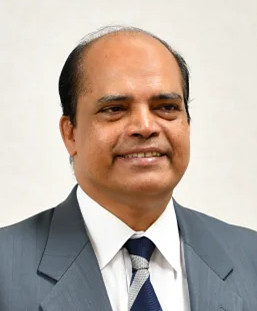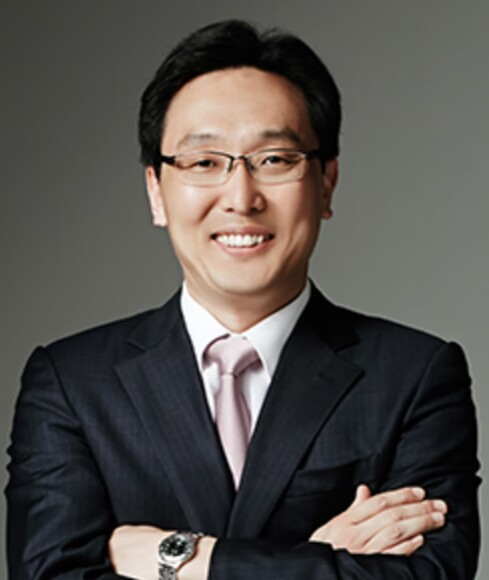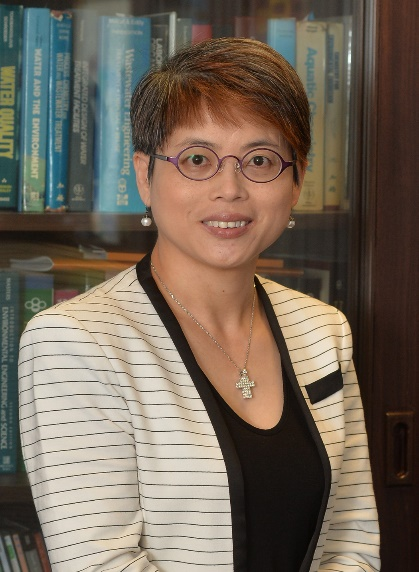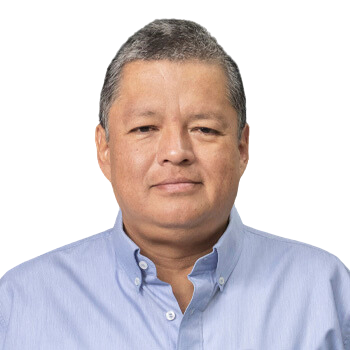Keynote Speakers

Prof. Puthenkalam John Joseph, Sophia University,
Japan
Biography:
John Joseph Puthenkalam, Ph.D., is a Professor of Economics, at the
Faculty of Economics, & Professor, at the Graduate School of Global
Environmental Studies, Sophia University, Tokyo, Japan. He serves as a
Board Member of the Sophia School Corporation since 2016 to present. He
was also Academic Dean of the Graduate School of Global Environmental
Studies: 2015-2017. After obtaining bachelor’s and master’s degrees in
economics, Philosophy and Theology in India and Japan, he continued his
studies and obtained Ph.D. in Economics, from the University of Glasgow,
United Kingdom in 1996. He was awarded First Class and First Rank in
M.A. (1984). He also won The Straniak Foundation Philosophy Prize,
Switzerland, 1993 and in 1998. He was granted a Senior Fellowship, at
the University of Bonn, Germany, 2001. His published books include, "The
Collision of Cultures? Dialogue Between Globalization and Cultural
Identity", Academia Verlag, Germany, 200l. “Dialogue Among
Civilizations: Zukunftiges Menchsein : Ethik zwischen Ost und West Nomos
Verlagsgesellschaft Baden-Baden, Germany, 2003,(Edited Volume).
“Economic Growth, Democracy and Human Development”, Claretian
Publications, Bangalore, 2016. “Global Development Analysis: Developing
Countries, Millennium Development Goals & Sustainable Development
Goals”, Sophia University, Tokyo, 2020. Terra Thrive: Achieving SDG 15:
Life on Land for Future Generations, Springer Nature Switzerland,
2025 (to be published)
(N.B. For More details about his Books, academic presentations, and
Journal articles etc.,
Please refer my Home Page: https://pweb.cc.sophia.ac.jp/j-puthen/)
He serves as the Project Leader for the 17 SDGs Book series a
collaborative research work between Graduate School of Global
Environmental Studies, Sophia University, Tokyo, and Christ University,
Bangalore, India.
Speech title "Renewable Energy: Dilemma of Developing Countries"
Abstract-There are 193
sovereign countries in the world, and they are classified, according to
The World Economic Situation and Prospectus (WESP) into one of three
broad categories: developed economies, transition economies and
developing economies. Developing economies’ sustainable development
needs sustainable energy. The bottom two stories of sustainable energy
edifice are energy saving and energy efficiency. These two spaces are
more important and need less economic resources to build.
The entire edifice is used by many of the 17 UN Sustainable Development
Goals – from expanding access to electricity, to improving clean cooking
fuels, to reducing wasteful energy subsidies, to curbing deadly air
pollution around the world and for many more human activities for
development. On detailed observation we find that all the development
goals in fact are directly or indirectly connected, set in a sustainable
energy scenario. The earth thrives with the energy gifted by the Sun for
millions of years. Humans evolved from their birthplace, the forest, to
the evolved state today using this energy. Human beings began to use
condensed energy from fossil fuels during the industrial phase of
economic development. In this process the environment is polluted.
Pollution levels reached staggering heights and brought about many small
and big maladies. Climate change and health problems caused life
miserable for millions of all age groups. Developing countries are the
most affected in the race of development. Thinkers, activists and
decision makers looked for way out. The new and renewable energy sources
showed an alternative sustainable path for development. Using renewable
energy technologies, developing countries gain the advantage of not
climbing the fossil energy mountain to achieve progress like the
developed countries of the fossil era. But the transition needs lots of
investment to benefit from renewable anergy. This is the dilemma for all
developing countries: how to move away from fossil energy to renewable
energy. As a case study, in this presentation I would introduce India as
it is on fast-track development of renewable energy technology with a
target of 500 GW of renewable energy by 2030. Cochin International
Airport Ltd (CIAL) in Kerala state is the world's first airport fully
powered by solar energy. India is also encouraging all institutions to
take up the renewable energy development path. Cities, villages and many
educational institutions in India are now fully solar powered. Renewable
Energy Centre Mithradham in India is the first fully renewable energy
based educational institution in India dedicated to environment and
renewable energy and is model for sustainable living. This model could
be replicated all over the world for a sustainable world.

Prof. Ildoo-Chung, Pusan National University, Busan,
Korea
Biography: Professor Ildoo Chung joined the faculty of the Department of Polymer Science and Engineering at Pusan National University, Korea, in 2005. Prior to that, he completed his postdoctoral training with Professor Jimmy Mays in the Department of Chemistry at the University of Tennessee, USA, and with Professor Dong Xie in the Department of Biomedical Engineering at the University of Alabama at Birmingham, USA. He received his Ph.D. from Pusan National University in 2000. He has served as the editor-in-chief of the Journal of Adhesion and Interface and as a member of the board of directors of the Polymer Society of Korea, the Korea Society of Adhesion and Interface, the Korea Polyurethane Society, and the Asian Cyclodextrin Conference. He has over 130 peer-reviewed publications and over 200 presentations at national and international conferences. His research interests are focused on polymer synthesis, including atom transfer radical polymerization (ATRP) and reversible addition-fragmentation chain transfer (RAFT) polymerization, applied to advanced polymeric biomaterials such as drug delivery systems, hard/soft tissue compatible polymers, photocurable 3D printing polymers, biodegradable polymers, and composite systems.
Speech title "Biodegradable and thermoresponsive hollow porous micro/nanoparticles for sustained drug release"
Abstract-Various types of porous biodegradable polymers based on polycaprolactone (PCL), polylactide (PLA), and polyurethane were synthesized and used as drug delivery vehicles for bupivacaine and carboplatin. Porous biodegradable microspheres were fabricated by successful RAFT polymerization of methyl vinyl ketone (MVK) onto PCL and PLA, which was first synthesized by ring opening polymerization of lactide followed by an oil/water emulsion-evaporation method, then finally photodegradation of PMVK blocks by UV irradiation. Biodegradable porous polyurethane nanoparticles have also been fabricated using water-in-oil-in-water double emulsion and solvent evaporation methods. These nanoparticles are composed of biodegradable and biocompatible polyfumarateurethane (PFU) and L-threonine polyurethane (LTHU), designed for degradation through hydrolysis and enzymatic activity, facilitated by the presence of ester bonds and peptide bonds within the polymer backbone. The morphology of microspheres was spherical with smooth surfaces before UV irradiation. Microspheres fabricated only from PCL homopolymers could also retain their smooth surface after UV irradiation. However, those from PCL-PMVK and PCL-PLA-PMVK block copolymers had rough surfaces and porous structures after UV irradiation due to the photodegradation of PMVK blocks as a porous template. The porosity and shape of the microspheres and shape of microspheres were dependent on the PMVK contents and size of microspheres. In addition, the drug loading, encapsulation efficiency, and drug release profiles, using UV-Vis spectroscopy, showed the highest encapsulation efficiency with 2.5% drug, and sustained release profile.

Prof. Irene M. C. LO,
Hong Kong University of Science and Technology, China
Biography: Irene Lo is currently a Chair Professor in the Department of Civil and Environmental Engineering at The Hong Kong University of Science and Technology. She is an Elected Foreign Member of the European Academy of Sciences and Arts, and Elected Fellow of Hong Kong Academy of Engineering. She is also a Fellow of Hong Kong Institution of Engineers, and Fellow of the American Society of Civil Engineers. She was appointed by HKSAR Government as Justices of the Peace (JP) in 2017. She was also Adjunct Professor of Tongji University, Tianjin University, Jilin University and Harbin Institute of Technology. She had been Visiting Professor of Technical University of Denmark and the University of Wisconsin at Madison.
Prof. Lo is an internationally renowned scholar and is among the first to invent iron-based nanomaterials and photocatalytic materials for the removal of heavy metals, organics, and emerging pollutants such as antibiotics from water and subsurface environment as well as to investigate the fundamental understanding of the pollutant removal mechanisms. Her research is ground-breaking and innovative, sustainable, and the outcome application is economical. She was the recipient of numerous prestigious international research awards, such as 2025 Career Award by Proteomass Scientific Society, 2021 ES&T Best Critical Review Paper Awards-First Runner Up, 2007 ASCE Samuel Arnold Greeley Award, 2009 ASCE Wesley W Horner Award, and the 2012 ASCE EWRI Best Practice-Oriented Paper Award. In addition, she received the 2019 Higher Education Outstanding Scientific Research Output Awards in the Natural Science/Technology Advancement by Ministry of Education, China. She has been invited to give over 100 plenary/keynote/invited speeches at many international and regional conferences in Asia, Europe, Africa, and North America.
Her research interests include advanced oxidation processes and nanoparticles/nanotechnology for environmental applications. Her citation is 24000+ with H-index 82, as reported by Google Scholar. She was recognized as "Top 2% Scientists in the World” by Stanford university in the past years since 2019.
Speech title "Generation of Renewable Energy by Treating Wastewater using Low Carbon Photoelectrochemical Technology"
Abstract-Conventional biological wastewater treatment using activated sludge process and disinfection process to remove contaminants and inactivate bacteria suffer from three major limitations: (1) intensive carbon emissions, (2) excessive power consumption, and (3) chemical intensity induced by chemical addition. Aiming to address these limitations, we develop a novel low carbon and chemical-free photoelectrochemical (PEC) system for saline sewage treatment to meet the discharge standard coupled with hydrogen generation. In our batch PEC reactor, two ports for water sampling and gas collection were also established in the system. Full degradation of NH3-N and inactivation of E. coli is achieved by the PEC/r-BiVO4 system, while 93.2 % of COD is degraded within 40 minutes. It is notable that, after the PEC wastewater treatment, the effluent meets the local discharge standards for COD, ammonia-N, and E. coli under 2.0 V vs. Ag/AgCl. To highlight the ability of the PEC system to generate hydrogen gas as potential green energy, it is found that 633.1 μmol of H2 evolved (6.33 mol/m3, equals 0.29 kWh/m3 of electricity) in 40 minutes of PEC reaction. After a verification of the feasibility of applying the batch PEC system to real sewage treatment, we fabricated the PEC prototype reactor stepping forward the industrial application of the developed technique. In comparison to the conventional biological treatment process, the prototype PEC system achieved significant reductions in greenhouse gas emissions. Specifically, it accomplished a 99.3% reduction in CH4 emissions, and a substantial 93.8% reduction in N2O emissions. Furthermore, the PEC system delivered outstanding environmental benefits, achieving 95.8% reduction in scope 1 emissions, offsetting scope 2 emissions through H2 evolution, and an 95.5% reduction in total carbon emissions.

Prof. Patrick Townsend Valencia, Escuela Superior Politécnica del Litoral, ESPOL,
Ecuador
Biography: Patrick Townsend focuses his research on the development of new viscoelastic and auxetic composite materials to prevent damage in fiberglass and glass fiber reinforced plastic (GFRP) vessels caused by the wave impact phenomenon known as slamming. His work aims to extend the service life of high-speed vessels by protecting laminates from microcracks and delaminations. He has conducted studies on the mechanical behavior of GFRP hull laminates using auxetic sheet designs to enhance energy dissipation under impact. His research combines laboratory experiments, 3D printing of second-generation auxetic components, and comparative mechanical testing to evaluate the effectiveness of modified specimens. He has collaborated with institutions such as the Escuela Superior Politécnica del Litoral (ESPOL) in Ecuador and the Materials Research Center at the Polytechnic University of Madrid, as well as with shipyards engaged in the construction of planing hull vessels. He has demonstrated that auxetic sheets with an “M”-shaped geometry are the most effective in absorbing energy under uniaxial compression, simulating quasi-static impact conditions. His work has also focused on the detection and mitigation of debonding—a critical failure mode that can lead to delamination at the bottom of vessel hulls. To study this, he has designed specimens modified with viscoelastic cores produced by 3D printing and compared them to unmodified samples through tensile and bending tests. The results revealed improved crack propagation resistance and enhanced stress-strain behavior in the modified composites. His current publications serve as a foundation for the redesign of GFRP naval structures, and his latest advancements will be presented at the ICMFM2026 conference.
Speech title "Effect of the tensile behavior of defects caused by gas bubbles on the repair process of GFRP laminates"
Abstract-This study experimentally analyzes the effect of entrapped gas
bubbles in GFRP repairs on naval structures, focusing on a vessel
operating in the Galápagos Islands. Specimens are fabricated following
the ISO 527-4:2022 standard using hand lay-up techniques on flat molds,
incorporating both defect-free and intentionally bubble-induced samples.
Uniaxial tensile tests are performed to assess variations in mechanical
behavior caused by voids across the repair width. The methodology
includes a comparative analysis between unrepaired (original) and
repaired zones, allowing the quantification of strength loss due to
entrapped air. Given that the hull of a vessel is cyclically subjected
to tensile and compressive stresses depending on sea conditions, this
testing approach offers a realistic assessment of how repair defects can
compromise structural integrity. The results aim to inform best
practices in composite repair and highlight the importance of
manufacturing quality in restoring mechanical performance.